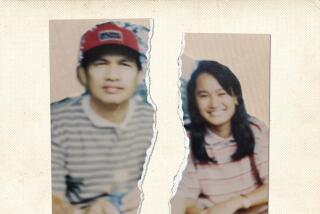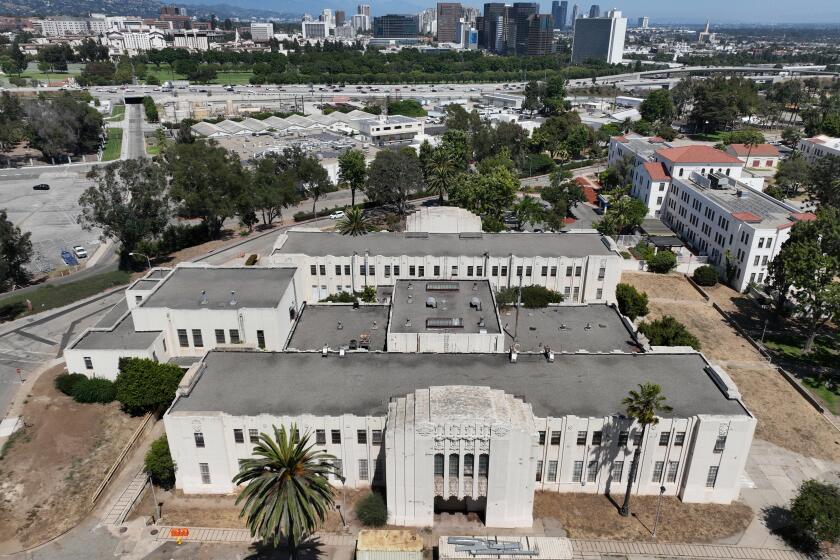The Rise and Fall of a Once-Good Cop
Ruben Palomares was raised in poverty, beaten by a drunken stepfather and bullied by other kids. Just before his first communion at age 12, his favorite uncle -- a man he considered his best friend -- was killed in a drug deal.
These were formative forces in Palomares’ early years. They made him yearn to be a better dad than the one he had, to excel in sports despite his small stature and to get a job as a Los Angeles police officer -- so he could put drug dealers like the one who killed his uncle in jail.
In his early 20s, he seemed destined to live the life he envisioned. He married a girl from the neighborhood and became a doting father. He was an exceptional boxer, seldom drank and never used drugs. In 1993, he was hired by the LAPD.
Sadly, said Reyna Palomares, his former wife of five years, “that’s when everything went downhill.”
Today, Ruben Palomares sits in federal prison, the admitted mastermind of a violent band of allegedly rogue officers and others who committed a string of armed robberies across Southern California staged to look like law enforcement raids.
He has agreed to cooperate with investigators in hopes that he’ll one day be released, despite having agreed to plead guilty to charges that carry a potential life sentence.
Court files containing a psychological evaluation of Palomares and interviews with friends, family and co-workers offer revealing details about his journey from idealistic officer to corrupt cop.
The documents portray a man who began his career as a wide-eyed recruit, wanting nothing more than to fulfill the LAPD’s motto of “to protect and to serve,” one psychologist wrote in a court evaluation. Ultimately, he “threw in the towel and gave in to being the type of bad person he had so long fought against becoming.”
“Mr. Palomares struggles with a darker side,” said Meredith Friedman, the psychologist. “[He] is a man who is internally at war with himself.”
Constant Struggle
Ruben Palomares’ childhood was far from idyllic. He was born in Jalisco, Mexico, on Nov. 18, 1969, the result of a union between his mother and a man who took advantage of her and then abandoned her at a bus stop.
His mother later married another man, who moved the family to Los Angeles when Palomares was a year old.
Money was a constant struggle for the family. Every year it seemed there was another mouth to feed. In all, there were 10 children in the Palomares family. His stepfather worked in construction but frequently lost jobs, Palomares said in court documents, because he was a drunk. To help out, Palomares collected aluminum cans. At age 12, when he started working in construction, his favorite uncle was killed in a drug deal gone awry.
Young Palomares had other problems, too. He said his stepfather was physically abusive. Palomares said he “couldn’t even look at him for fear it would set him off.” To escape his troubled home life, Palomares immersed himself in sports. At the Hollenbeck Youth Center in East Los Angeles, he started boxing. When he was 16, he entered his first Golden Gloves tournament -- and won it.
His aspirations for making the 1988 Olympics were dashed because he wasn’t a U.S. citizen. Undeterred, he became one at 19 and trained for the 1992 Olympics, sparring with the likes of Oscar de la Hoya.
Shortly after graduating from high school, Palomares started dating a pretty girl named Reyna. They fell in love as he continued to train for the Olympics. They married not long after Reyna became pregnant with the first of their three children.
Those were happy times for Palomares.
“One couldn’t help but take a shine to him. He was just a really special kid,” said Dick James, the director of fundraising at the Hollenbeck Youth Center.
When Palomares didn’t make the 1992 Olympic team, he moved on to another lifelong dream: joining the LAPD.
‘He Wasn’t the Same’
Reyna Palomares said things began to change almost immediately.
“As soon as he became a cop he became very distant. He wasn’t the same Ruben,” she recalled.
The problems got worse, she said, when he graduated from the Police Academy and was selected to work juvenile narcotics, an undercover assignment in which he posed as a drug user at a local high school.
“He would go to school dressed like a gangster, like a cholo,” Reyna Palomares said.
Retired LAPD Cmdr. Rudy DeLeon, who had known Palomares from his days at the Hollenbeck youth center and who recommended him for the academy, said Palomares called to seek his advice about working undercover.
DeLeon did not recommend it.
“It’s not that it’s a bad thing, it’s just that I worry how young officers will handle the temptation that comes with it,” DeLeon said. “I figured if anyone could handle it, Ruben could. But, still, I worried.”
It was while working undercover in the schools that Palomares met Dawna Davis in 1994. He and Davis, also an undercover officer, began an affair, resulting in the end of his marriage to Reyna, court documents show. Though he and Davis never wed, they lived together for years and had two children together.
In 1995, Palomares transferred to the Rampart Division, where he continued to work undercover. He loved his job. His superiors gave him rave reviews for his service in 1996, 1997 and 1998. A “leader with a reputation for excellence,” one captain wrote.
“Another year of stellar service,” commented another.
It seems the first time anyone had anything negative to say about Palomares’ work for the LAPD was in 1999.
That’s when detectives investigating the Rampart scandal asked corrupt Officer Rafael Perez what he thought of Palomares.
Perez told the detectives that Palomares had intimated to him that he had been involved in a bad shooting in 1998 as well as other misconduct.
“I would look at everything Palomares has done, every arrest that he’s made,” he said.
Palomares was subsequently investigated as part of the Rampart probe but was never charged.
Unbeknownst to Perez and the LAPD, Palomares and his crew of bandits had already committed a string of brazen armed robberies. They masqueraded as on-duty narcotics officers and targeted drug dealers.
In the summer of 2001, Palomares and four other men were arrested in San Diego while buying 10 kilos of cocaine from undercover DEA agents.
One of the men with him that day immediately began cooperating with authorities. They launched an extensive federal probe into Palomares and about 20 other people involved in the robbery gang, five of them current or former law enforcement officers.
Last year, with the larger investigation still underway, Palomares pleaded guilty to charges related specifically to the San Diego drug deal and was sentenced to 15 years in federal prison.
Before sentencing, he sought to blame his descent into crime on troubles he was having at the LAPD. He said he became bitter about the department’s “going overboard” in seeking to punish him for a practical joke in which another officer was slightly injured after Palomares and some fellow cops pulled a fire alarm in a hotel where they were staying. He was also disillusioned about injuries to his shoulder, which he suffered while teaching self-defense classes for the department.
Fearful that he’d be fired over the prank, Palomares said, he began drinking heavily, putting away a fifth of vodka a day. He was taking pain pills and smoking pot. He stopped working out and put on 30 or 40 pounds.
“All I could think about was how I was going to provide for my family,” he said.
At home after having surgery on his shoulder, Palomares was not satisfied with the money he was receiving from workers’ compensation. To augment his income, he began collecting debts for drug dealers. Finally, he became one himself.
“I went against everything I held close to my heart,” Palomares said, in a plea for leniency. “I am filled with shame, guilt, remorse, embarrassment and humiliation. Never did I expect to be on this side of the law.”
The problem with his impassioned mea culpa is that Palomares admitted in court documents filed last week that his crime spree began well before he hurt his shoulder or committed any prank.
On Saturday, Palomares’ attorney had a new explanation for his client’s turn to crime. He said the catalyst for his downward spiral was an off-duty shooting in 1994, in which Palomares was injured. That made him a “hardened man,” attorney Winston Kevin McKesson said. “That’s what changed his personality.”
More to Read
Sign up for Essential California
The most important California stories and recommendations in your inbox every morning.
You may occasionally receive promotional content from the Los Angeles Times.











